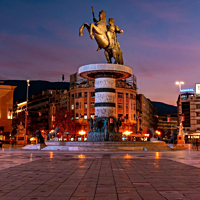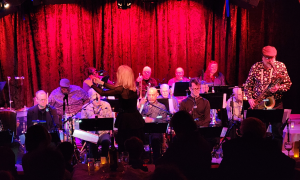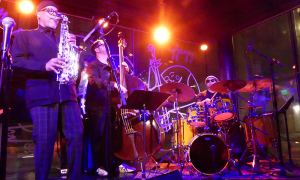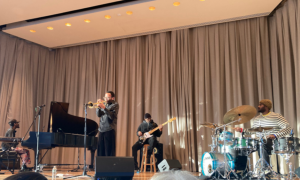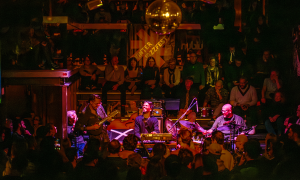Home » Jazz Articles » Live Review » Maria Mendes and the Macedonian National Jazz Orchestra ...
Maria Mendes and the Macedonian National Jazz Orchestra at the National Opera and Ballet
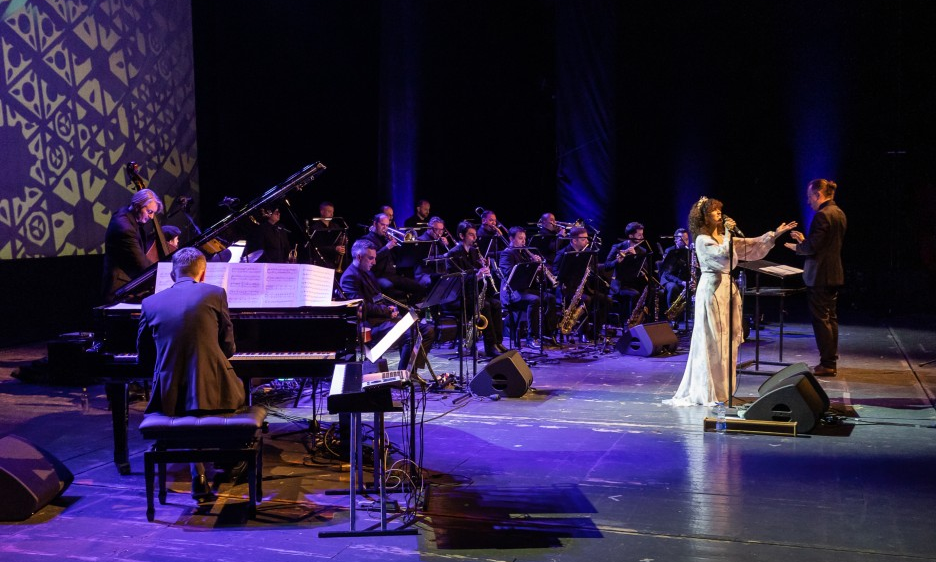
Courtesy Maja Argakijeva
From the moment Mendes began singing, it was as if a warm light had entered the hall.
National Opera and Ballet
Skopje, Macedonia
March, 25, 2025
Music may not be able to solve all the world's problems, but it has the power to heal wounds and bring comfort to those who need it most. That was precisely what happened when Portuguese singer Maria Mendes took the stage with the Macedonian National Jazz Orchestra Big Band, under the expert direction of conductor and arranger Vladimir Nikolov, in a performance that transcended mere entertainment.
The evening at the National Opera and Ballet was not just another concert—it was a gesture of solidarity, a heartfelt offering to a nation in mourning. The fire in the city of Kochani that claimed the lives of many young men and teenagers, had left the audience heavy hearted. The decision to make this event a charity concert, with all proceeds going to the affected families, gave the music a deeper meaning.
From the moment Mendes began singing, it was as if a warm light had entered the hall, lifting the weight of sorrow. Her voice, rich and expressive, carried with it a sense of both longing and hope, drawing the audience into her world. Mendes is known for her extraordinary charisma, captivating not only with her vocal prowess but also with her ability to connect deeply with her audience. Her voice has a unique ability to shift between delicate nuance and sweeping, emotional highs, creating a presence that is impossible to ignore. As she sang, the air seemed to hum with her energy, and it was clear that she wasn't just singing songs; she was offering something personal, a bridge between pain and healing. The Macedonian National Jazz Orchestra Big Band was the perfect accompaniment to Mendes' voice, creating a rich and layered soundscape that elevated every song. The arrangements, carefully crafted by Nikolov, showcased the immense talent of the orchestra while allowing Mendes' voice to soar. The big band was not merely an accompaniment—it was a living, breathing entity that responded to Mendes' vocal cues, pushing the performance to new heights.
The setlist was a masterful blend of traditional fado and jazz, each song carefully arranged to showcase both Mendes' stunning vocal range and the orchestra's lush instrumentation. "Há Uma Música do Povo" featured Gordan Spasovski's delicate piano work, further deepening the emotional impact of the evening. "Tudo Isto É Fado," with Senad Usein's warm flugelhorn solo, was a reminder of how deeply fado and jazz can intertwine, both genres carrying the weight of emotion and storytelling. Before she sang, she would address the audience, talk with them, introduce the songs, mention the composers and arrangers, or thank the orchestra's soloists, including the contributions of Nikolov, whose arrangements were key in bringing the evening's music to life. Her words were always thoughtful, providing insight into the world behind the music and allowing the audience to feel even more connected to the performance.
As the evening progressed, Mendes moved seamlessly between traditional Portuguese songs and her own compositions. "Dança do Amor" introduced a more playful, rhythmically intricate side of her artistry, with Ivan Ivanov's soprano sax adding a layer of sophistication. The traditional "Quando Eu Era Pequenina" saw Viktor Filipovski's dynamic drumming and Kiril Kuzmanov's expressive alto sax lead the orchestra into a mesmerizing groove.
A special highlight of the night was "Hermeto's Fado for Maria," a composition by the legendary Brazilian musician Hermeto Pascoal. The piece, performed with Zoran Kostadinovski's soulful guitar, felt like a perfect tribute to Mendes' ability to bridge cultures and styles. She had a moment to share with the audience the unique story behind the piece, revealing the original sketch of the fado from Pascoal, drawn on the back of a flight map, which she proudly showed before the performance.
The emotional peak of the concert came with "Foi Deus." With just Martin Gjakonovski's bass and Spasovski's piano as accompaniment, Mendes delivered a performance that was both intimate and deeply moving. The silence that followed her final note spoke louder than any applause ever could. Mendes' voice in this piece was almost a whisper at times, creating an intimacy that left the audience breathless.
"Com Que Voz," a song with lyrics by the great Portuguese poet Luíz de Camões, brought the audience into a world centuries old, where poetry and music are inseparable. Slavko Gjorgiev's clarinet solo wove through the melody like a voice from the past, echoing the deep-rooted traditions of fado. This was a song that fado legend Amália Rodrigues recorded at the peak of her powers in 1969.
The evening closed with "Asas Fechadas," a song that left the audience in quiet reflection, allowing the music's resonance to linger long after the final note had faded. The standing ovation that followed was not just for Maria Mendes or the Macedonian National Jazz Orchestra Big Band, but for the collective experience they had created—a moment of unity, solace and shared emotion. There was magic in the air, and Mendes' spirit remained strong even after the concert, where she hung out and talked to people, signing their CDs and engaging with everyone.
This concert was more than a musical event; it was a testament to the power of art in times of grief. Maria Mendes, with her radiant presence and extraordinary voice, and the Macedonian National Jazz Orchestra Big Band, with their impeccable musicianship and the guiding hand of Vladimir Nikolov, reminded everyone present that even in the darkest of times, music can be a source of light.
Tags
PREVIOUS / NEXT
Support All About Jazz
 All About Jazz has been a pillar of jazz since 1995, championing it as an art form and, more importantly, supporting the musicians who make it. Our enduring commitment has made "AAJ" one of the most culturally important websites of its kind, read by hundreds of thousands of fans, musicians and industry figures every month.
All About Jazz has been a pillar of jazz since 1995, championing it as an art form and, more importantly, supporting the musicians who make it. Our enduring commitment has made "AAJ" one of the most culturally important websites of its kind, read by hundreds of thousands of fans, musicians and industry figures every month.





